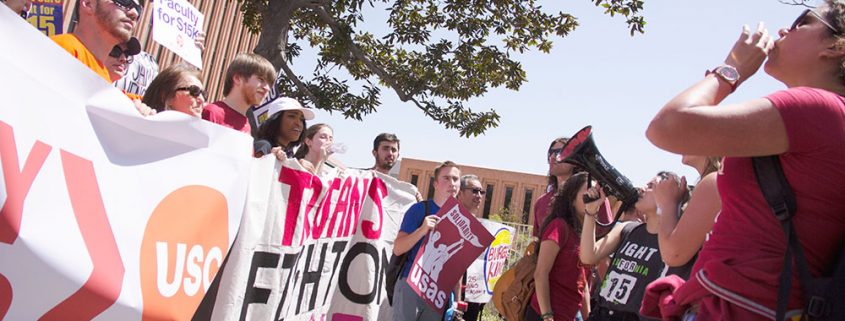University Faculty Union members left in limbo
In February 2016, a vote by the faculty of the Dornsife College of Letters, Arts and Sciences resulted in a loss for the USC Faculty Union, a group of non-tenure-track faculty working to guarantee higher wages and benefits, which they hope to achieve by creating a labor union. More than a year later, faculty members involved are left questioning the current state of the union.
After the vote, the USC Faculty Union appealed to the National Labor Relations Board, claiming that Provost Michael Quick’s emails leading up to the vote discouraged faculty members from supporting unionization. The NLRB ruled in favor of the Faculty Union, invalidating the results of the vote and scheduling a redo.
As of September, Dornsife faculty members had filed charges against USC with the NLRB, accusing the University of unfair labor practices. They requested a delay in the upcoming unionization vote. A few months after the NLRB said there would be a new vote, its national offices reversed the decision.
Professors are divided over the decision to sue the University. Steve Posner, assistant professor of writing is not part of the Faculty Union, but he said he follows it closely.
“I am for the union, but I do not think Michael Quick did anything improper,” Posner said. “He has stated the University’s position and has sent emails which were informative. There were no threats and there was no intimidation.”
The Service Employees International Union was helping the Faculty Union organize. Now, the SEIU is focusing on graduate assistants who are trying to unionize.
“We’re pretty much in limbo,” said professor Sandra Marie Ross, a member of the Faculty Union.
Posner said that the approach to unionization was flawed.
“I think unionization is a good idea, but this particular union made a mistake,” Posner said. “They didn’t take the time to learn about the campus culture and the specific concerns of professors, so they weren’t able to address the concerns.”
In recent months, the Faculty Union has refrained from continuing to fight the decision.
“I would imagine the union figures this is a fight not worth pursuing,” Posner said. “I think eventually a union will come around again, and the University has an opportunity to change its policies to make a union unnecessary. So far, I don’t see that happening.”
Ross said there is increasing dominance of non-tenure-track faculty who have little job security. Yet, faculty members are left in the dark about hiring and promotion decisions.
“What we want is transparency,” Ross said. “We want to know why some non-tenure-track faculty get promoted and others don’t. We want collective bargaining, and just more accountability. We are the future of the University.”

